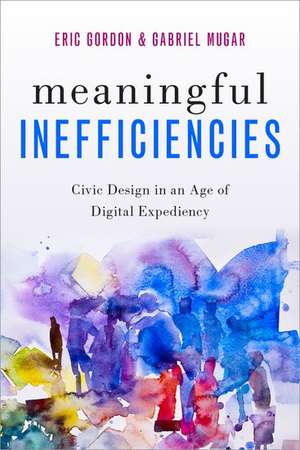Meaningful Inefficiencies: Civic Design in an Age of Digital Expediency
Autor Eric Gordon, Gabriel Mugaren Limba Engleză Hardback – 26 mar 2020
| Toate formatele și edițiile | Preț | Express |
|---|---|---|
| Paperback (1) | 195.56 lei 10-16 zile | |
| Oxford University Press – 26 mar 2020 | 195.56 lei 10-16 zile | |
| Hardback (1) | 583.33 lei 31-37 zile | |
| Oxford University Press – 26 mar 2020 | 583.33 lei 31-37 zile |
Preț: 583.33 lei
Preț vechi: 780.26 lei
-25% Nou
Puncte Express: 875
Preț estimativ în valută:
111.62€ • 116.84$ • 92.90£
111.62€ • 116.84$ • 92.90£
Carte tipărită la comandă
Livrare economică 19-25 martie
Preluare comenzi: 021 569.72.76
Specificații
ISBN-13: 9780190870140
ISBN-10: 0190870141
Pagini: 202
Dimensiuni: 146 x 224 x 19 mm
Greutate: 0.33 kg
Editura: Oxford University Press
Colecția OUP USA
Locul publicării:New York, United States
ISBN-10: 0190870141
Pagini: 202
Dimensiuni: 146 x 224 x 19 mm
Greutate: 0.33 kg
Editura: Oxford University Press
Colecția OUP USA
Locul publicării:New York, United States
Recenzii
Meaningful Inefficiencies is a valuable contribution to current debates and academic theory in the fields of communication and media studies.
The concept of 'meaningful inefficiencies' is a productive addition to the field-it moves away from the utilitarian 'solutionist' view of smart tech and, instead, puts people at the forefront of the future.
This book is the perfect combination of radical and practical. What would the institutions that set the foundation for civic health look like if they operated through the lens of care? This simple question is profoundly consequential, and readers get to see that brighter and more functional future with the case studies provided herein. This book provides the spark for scholars, leaders, and workers in civic spaces to reorient around care, and I cant wait to see the positive change that follows.
The concept of 'meaningful inefficiencies' is a productive addition to the field-it moves away from the utilitarian 'solutionist' view of smart tech and, instead, puts people at the forefront of the future.
This book is the perfect combination of radical and practical. What would the institutions that set the foundation for civic health look like if they operated through the lens of care? This simple question is profoundly consequential, and readers get to see that brighter and more functional future with the case studies provided herein. This book provides the spark for scholars, leaders, and workers in civic spaces to reorient around care, and I cant wait to see the positive change that follows.
Notă biografică
Eric Gordon is a professor of civic media and the director of the Engagement Lab at Emerson College in Boston, Massachusetts. His research focuses on civic engagement and the transformation of public life and governance in digital culture. He has served as an expert advisor for local and national governments, as well as NGOs around the world, designing responsive processes that encourage play, delight, and deliberation. He is the author of two books about media and cities and, most recently, is the editor of Civic Media: Technology, Design, Practice (MIT Press, 2016) and Ludics: Play from Antiquity to Present (Palgrave, 2020). Gabriel Mugar (Ph.D., Information Science and Technology, Syracuse University) is a design researcher at the global design consultancy, IDEO. He specializes in working with communities and organizations to design opportunities for learning, collaboration, and storytelling.
